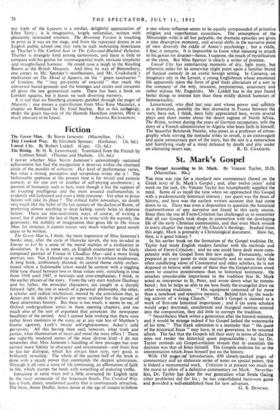Fiction
The Green Man. By Storm Jameson. (Macmillan. 15s.) I DOUBT whether Miss Storm Jameson's astonishingly sustained • achievement has had the recognition it deserves within the charmed circle of the pundits of criticism. Her level of performance varies, but what a strong, perceptive and scrupulous- writer she is ! The fashionable applause at the present time is for trivial and esoteric comedy or for one sort or another of self-pitying cerebration ; a passion of humanity such as hers, even though it has the support of an exacting intelligence and the most assured craftsmanship, is evidently old-fashioned and even a little tiresome. Yet what in prose fiction will take its place ? The critical habit nowadays, no doubt very much like the habit of the last century of the decline of Rome, of preferring almost anything to deep feeling, surely helps to deprave fiction. There are nine-and-ninety ways, of course, of writing a novel, but if almost the last of them is to write with the warmth, the generosity, the nobility of imagination that gives life to The Green Man, for instance, it cannot matter very much whether good novels cease to be written.
The Green Man is, I think, the most impressive of Miss Jameson's books since, after the cycle of Hansyke novels, she was invaded in Europe to Let by a sense of the moral realities of a civilisation in dissolution. It is, in some sort, an English counterpart to the finely composed portrait of France 'in` Cloudless May—and a more living portrait, too. Not, I should say at once, that it is without weaknesses. A long book, ambitiously planned, its central theme richly orches- trated where a fashionable talent would be content with a niggling little tune shared between two or three voices only, stretching in time from 1930 until 1947, it hesitates and over-emphasises, I think, in the earlier phases of the story. From the very start Andrew Daubney and his father, the principal characters, are caught in a sharply focused light, the one in search of a personal philosophy, the other, a scholar and radical intellectual, moved by the conviction that, as Acton put it, ideals in politics are never realised but the pursuit of them determines history. But there is too much, it seems to me, of Oxford undergraduate antics in these opening chapters, and too much also of the sort of argument that annotates the newspaper headlines of the period. And I cannot help wishing that there were rather fewer monsters in the story, or at any rate less of Matthew's frantic egotism, Leah's insane self-righteousness, Acker's cold perversity. All this having been said, however, what truth and justice, what illumination of heart and mind the story offers There are superbly rendered scenes of the most diverse kind—I do not remember that Miss Jameson's handling of love passages- has ever carried more fidelity to character and circumstance—and from first to last her dialogue, which has always been very, very good, is brilliantly revealing. The whole of the second half of the book is done with a steady power that commands the deepest admiration. Through it all runs a sense of life continuing, an affirmation of fpith in .life, which stamps the. book with something of enduring virtfie.
Immature in some ways and a little coarsened for English taste by the rural vernacular of the American South, This Crooked Way has a fresh, direct, unadorned quality that is continuously attractive. The hero, Amos Dudley, leaves home at the age of sixteen to follow a star whose influence seems to be equally compounded of primitive religion and superhuman cussedness. The atmosphere of the Mississippi wilds is all but palpable, the dramatic episodes are given a nice descriptive economy, and several shifts in the narrative point of view diversify the riddle of Amos's psychology ; but a riddle, I fear, it remains. It is impossible to know what meaning to attach to his genius for disaster—hence, I suppose, the touch of mystification at the close. But Miss Spencer is clearly a writer of promise.
Unreal City has entertaining moments of dry, light irony, but otherwise relies for its somewhat slight point upon a familiar brand of farcical comedy, in an exotic foreign setting. In Caesarea, an imaginary city in the Levant, a young Englishman whose emotional life apparently takes the form of grief finds alleviation of a sort in the company of the wily, innocent, preposterous, unsavoury and rather tedious Mr. Eugenides. Mr. Liddell has in the past found better things to interest him than these mildly skittish-humours of homosexuality. Lenormand, who died last year and whose power and suttlety as a dramatist, possibly the best dramatist in France tetween the wars, have not, I think, been fully appreciated here, wrote several plays and short stories about the desert regions of North Africa. The Rising, written during the years of German occupation, tells the story of a French administrator in Algeria who loses faith in himself. The beautiful Bolshevik Natalie, who poses as a professor of ethno- graphy while stirring the nomadic tribes to revolt, is an extravagant and quite unnecessary part of the story, but the rest is a remorseless and horrifying study of a mind defeated by doubt and pity under







































 Previous page
Previous page